September 23, 2011
Weaned
At the age of 2 and one quarter and a bit, Harriet is now officially weaned, which I’m telling you now for a couple of reasons. The first is that I truly enjoying horrifying the kind of people who become horrified by the fact that I’ve breastfed for so long. The second reason is because it’s quite a milestone, and I don’t like the idea of breastfeeding having to be a private thing, business that I keep to myself for fear of horrifying somebody (except when I want to horrify someone, as previously noted), because it really is of the mundane essential stuff of life that I write about on my blog all the time. And the third reason I raise the topic here is because breastfeeding was always when I got my periodical reading done, and the loss of this reading time each day now means that I’ve got magazines piling up in my house at a terrifying rate. Plus it’s September, which means there is a new release out basically every day that I’m meaning to getting around to read, and the Victoria College Book Sale is this weekend (which is, as many of you know, the thing I enjoy in the world more than anything else at all except Afternoon Tea). So there will be books, books and more books, and now I’m a bit terrified at the prospect of my leaning tower of magazines.
September 22, 2011
Our Best Book from the library haul: Me… Jane by Patrick McDonnell
 Patrick McDonnell’s Me… Jane is the story of an ordinary little girl with a stuffed chimpanzee who just happens to grow up to be Jane Goodall. Significant for being the first biography Harriet’s ever encountered, it also stands up on its own merits as a picture book with delightful illustrations of little Jane getting up to adventures ordinary (sneaking into the hen house to watch hens laying eggs) and extraordinary (Jane imagining herself like Jane from the Tarzan stories swinging on vines through the jungles of Africa). The story awakes its reader to the “magical world full of joy and wonder”, and also tells tells the inspiring story of a little who dared to dream big and whose dreams came true.
Patrick McDonnell’s Me… Jane is the story of an ordinary little girl with a stuffed chimpanzee who just happens to grow up to be Jane Goodall. Significant for being the first biography Harriet’s ever encountered, it also stands up on its own merits as a picture book with delightful illustrations of little Jane getting up to adventures ordinary (sneaking into the hen house to watch hens laying eggs) and extraordinary (Jane imagining herself like Jane from the Tarzan stories swinging on vines through the jungles of Africa). The story awakes its reader to the “magical world full of joy and wonder”, and also tells tells the inspiring story of a little who dared to dream big and whose dreams came true.
In addition to McDonnell’s sweet cartoon rendering of Jane and all the animals, the text pages are enhanced by gorgeous scientific drawings of plants, insects, and other animals. Most remarkable are the samples of Jane Goodall’s own juvenilia, including official documents from a childhood club called “The Aligator Society”.
The end of the book contains a detailed “About Jane Goodall” section and even “A Message from Jane”, which urges that “the life of each one of us matters in the scheme of things”. From even the littlest stories come great things. Or maybe the message is more that even great things have little stories at the heart of them.
September 20, 2011
Another Belfast Man Doing Well
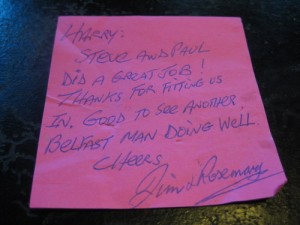 I found this on the ground on Saturday, and basically think it’s an entire novel condensed to a post-it note. Who is Harry? What kind of job did Steve and Paul do exactly? (I suspect dry-walling). Is Harry the Belfast man doing well? Can we take this to mean that Jim is a fellow well-doing Belfast man, or is he just someone who collects such people? How much is Rosemary really invested in the situation anyway? What was this note stuck to before it was so carelessly discarded? What’s Harry’s connection to Steve and Paul? And could there be any other names as archetypal as Harry, Steve, Paul, and Jim and Rosemary? Is this note not a throwback to a bygone age? Except for the pink post-it, of course. The pink post-it is very much of now.
I found this on the ground on Saturday, and basically think it’s an entire novel condensed to a post-it note. Who is Harry? What kind of job did Steve and Paul do exactly? (I suspect dry-walling). Is Harry the Belfast man doing well? Can we take this to mean that Jim is a fellow well-doing Belfast man, or is he just someone who collects such people? How much is Rosemary really invested in the situation anyway? What was this note stuck to before it was so carelessly discarded? What’s Harry’s connection to Steve and Paul? And could there be any other names as archetypal as Harry, Steve, Paul, and Jim and Rosemary? Is this note not a throwback to a bygone age? Except for the pink post-it, of course. The pink post-it is very much of now.
September 19, 2011
Cinderella Ate My Daughter by Peggy Orenstein
 The bad news about Peggy Orenstein’s Cinderella Ate My Daughter is that she’s preaching to the choir here. My husband and I both read this book, and came away more than ever firmly entrenched that girlie/princess culture is bad news for little girls. And not just because of the limited nature of the princess narrative and her identity, but because underneath it lies the trap of rampant consumerism. The great news, however, is that we can’t afford to join that culture anyway, which also comes with its own parenting challenges, but will make so many other things easier.
The bad news about Peggy Orenstein’s Cinderella Ate My Daughter is that she’s preaching to the choir here. My husband and I both read this book, and came away more than ever firmly entrenched that girlie/princess culture is bad news for little girls. And not just because of the limited nature of the princess narrative and her identity, but because underneath it lies the trap of rampant consumerism. The great news, however, is that we can’t afford to join that culture anyway, which also comes with its own parenting challenges, but will make so many other things easier.
Orenstein does a great job of showing that “princess culture” is such a recent phenomenon, and that signing up is just to play into corporate hands (and to get those hands into your pockets). That these companies are not simply giving consumers what they want, but are also intentionally coercing children into wanting consumer products that are expensive, and detrimental to the development of their self-image. She shows that companies are out to make a buck by gendering children’s toys (thereby ensuring that parents will have to buy two of everything), and also by inventing stages from toddler to tween to “pre-tween” so that nothing ever lasts more than a season.
Orenstein’s writing is funny, engaging, and self-deprecating as she draws on her own experiences as a mother negotiating the labyrinth of princess-dom. She doesn’t take cheap shots, most notably in her chapter on the child beauty pageant circuits. Many of her subjects are really easy targets, but Orenstein writes about them with sympathy, and also shows how their preposterousness is only a magnified version of most parents’ experiences with princess consumer culture, echoing those same old excuses: “But we’re only giving her what she wants” and “It’s doing no harm.” From reading this book, it becomes decidedly clear that neither of these statements are true.
Anyway, what’s strangest to me is that the choir Orenstein is preaching to isn’t all that big. I guess if it was, we’d all have nothing much to sing about. For me, one of the biggest surprises of parenthood all along has been that common sense is such a relative thing. It reminds me of when writer Carrie Snyder wrote about no-gift birthday parties in her parenting column (an idea we’ve since stolen), and got the most cruel (anonymous) responses, similar to those received by Orenstein herself when, as she writes, she first dared to suggest that princess-dom might not be doing our daughters a lot of good. Both mothers were accused of deprivation, which is not so unbelievable, I guess, when you consider that so many people think shoe shopping is exercising our democratic freedom (not to mention, how to be a feminist). Anyway, I guess what I mean is that these are the people who should be reading this book, but they won’t be, and that’s depressing.
September 19, 2011
I'll be there when Rebecca Rosenblum launches The Big Dream tomorrow. Will you?
 Tomorrow night, Rebecca Rosenblum launches The Big Dream at the Dora Keogh Pub on the Danforth. Rebecca has been my friend since I met her in Goldberry Long’s backyard in September 2005, though at that time I knew her as “the girl who worked at Harlequin” (this was before I discovered that everybody, in fact, has worked at Harlequin). Other important things about Rebecca are that one day I realized that “Becky” was written on her shoe, which is how I discovered that everybody calls her Becky, except for everybody she met after 2005 (perhaps she wasn’t wearing those shoes often enough?), and also that both of us had the same photocopied picture of Bob Geldof on our bedroom walls during high school.
Tomorrow night, Rebecca Rosenblum launches The Big Dream at the Dora Keogh Pub on the Danforth. Rebecca has been my friend since I met her in Goldberry Long’s backyard in September 2005, though at that time I knew her as “the girl who worked at Harlequin” (this was before I discovered that everybody, in fact, has worked at Harlequin). Other important things about Rebecca are that one day I realized that “Becky” was written on her shoe, which is how I discovered that everybody calls her Becky, except for everybody she met after 2005 (perhaps she wasn’t wearing those shoes often enough?), and also that both of us had the same photocopied picture of Bob Geldof on our bedroom walls during high school.
Three years ago, when her first book came out, Rebecca was the subject of one of my first interviews, which makes it all the more poignant that I’ll be interviewing her as part of her launch tomorrow, all up in front of the crowd and everything. I’m honoured to be a part of the event, so excited to celebrate this wonderful book with her, and also, I’ve made cupcakes. We’ve even got a babysitter! This is a big deal.
If you can’t make it, do c heck out the book. Yesterday morning, Margaret Atwood tweeted that she was looking forward to it, and as someone who just finished reading it, I can promise that Margaret Atwood will not be disappointed. Neither will you.
September 18, 2011
Eden Mills 2011
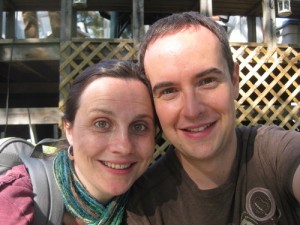 Last year, our Eden Mills Writers Festival experience was diminished by the efforts we spent on trying to get Harriet to fall asleep to no avail. Today we accepted that there would be no sleep (highly controversial), and had a marvelous time. The weather was glorious. We also particularly like Eden Mills because it functions in accordance with our family philosophy of not leaving the house early in the morning, and so there were pancakes, and pajama lazing. Then we hit the road, and the traffic was easy. The leaves were not as autumnal as in year’s past, but I was also wearing capris and sandals, and that was nice. We rolled in Eden Mills around 12:30, and so the day of literary festivalling began.
Last year, our Eden Mills Writers Festival experience was diminished by the efforts we spent on trying to get Harriet to fall asleep to no avail. Today we accepted that there would be no sleep (highly controversial), and had a marvelous time. The weather was glorious. We also particularly like Eden Mills because it functions in accordance with our family philosophy of not leaving the house early in the morning, and so there were pancakes, and pajama lazing. Then we hit the road, and the traffic was easy. The leaves were not as autumnal as in year’s past, but I was also wearing capris and sandals, and that was nice. We rolled in Eden Mills around 12:30, and so the day of literary festivalling began.
It was my fourth Eden Mills, by the way, and Stuart’s and Harriet’s third. The first readings I wanted 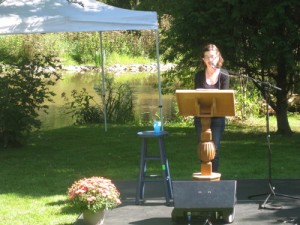 to see were the poets, but they were indoors in the Chapel, so Harriet and Stuart stayed outdoors with Harriet’s outdoor voice. And I heard Priscilla Uppall and Lorna Crozier, who were so, so wonderful. In exchange for missing the reading, H&S split a cupcake, so everyone was happy. Then we went to the children’s readings, where we heard Andrea Wayne von Königslöw, and Kari-Lynn Winters. I skipped out partway through Winters, however, so that I could hear my friend Julia read at the Fringe Stage, and she had her audience utterly engaged. It was a pleasure to see her there.
to see were the poets, but they were indoors in the Chapel, so Harriet and Stuart stayed outdoors with Harriet’s outdoor voice. And I heard Priscilla Uppall and Lorna Crozier, who were so, so wonderful. In exchange for missing the reading, H&S split a cupcake, so everyone was happy. Then we went to the children’s readings, where we heard Andrea Wayne von Königslöw, and Kari-Lynn Winters. I skipped out partway through Winters, however, so that I could hear my friend Julia read at the Fringe Stage, and she had her audience utterly engaged. It was a pleasure to see her there.
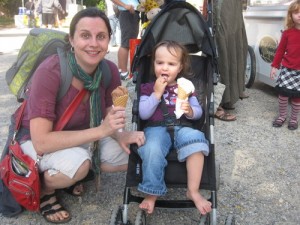 After that, I met back up with my family, and we went to hear Claire Tacon and Alison Pick. Then to the Organic Ice Cream sellers, who delighted everyone involved. We stopped on Publisher’s Way to do a bit of shopping, and to meet with our Biblioasis and TNQ friends. (It was a friend-filled day. Today Eden Mills was populated by some of our favourite people.) Must admit, was a little disappointed to see other indie presses missing, in particular Brick Books because I’d been looking forward to buying Stephanie Bolster’s new book. Alas, my heart was delighted by the new addition of Demeter Press, however, and the chance to meet the fine people there (whose work I’ve been a champion of in the past). We ended up buying Claire Tacon’s In the Field, Amanda Jernigan’s Groundwork, Rocking the Cradle by Andrea O’Reilly, and Andrea Wayne von Königslöw’s How Do You Read to a Rabbit?
After that, I met back up with my family, and we went to hear Claire Tacon and Alison Pick. Then to the Organic Ice Cream sellers, who delighted everyone involved. We stopped on Publisher’s Way to do a bit of shopping, and to meet with our Biblioasis and TNQ friends. (It was a friend-filled day. Today Eden Mills was populated by some of our favourite people.) Must admit, was a little disappointed to see other indie presses missing, in particular Brick Books because I’d been looking forward to buying Stephanie Bolster’s new book. Alas, my heart was delighted by the new addition of Demeter Press, however, and the chance to meet the fine people there (whose work I’ve been a champion of in the past). We ended up buying Claire Tacon’s In the Field, Amanda Jernigan’s Groundwork, Rocking the Cradle by Andrea O’Reilly, and Andrea Wayne von Königslöw’s How Do You Read to a Rabbit?
We went to see the magician next, who was awesome (though Harriet went into a frenzy when he started making balloon animals, 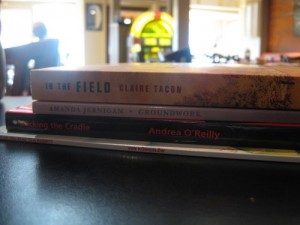 screaming, “I want monkey right now!” and we had to talk her down, because there weren’t enough to go around). And I wanted to stay for the last session to hear Johanna Skibsrud read from her new book, but Harriet was fading and we’re smart enough now to no longer push our luck. She’d been so good all day, and so Eden Mills was over while the going was still good. (I did get to sit across the aisle from Skibsrud at the poetry readings though, which was kind of cool).
screaming, “I want monkey right now!” and we had to talk her down, because there weren’t enough to go around). And I wanted to stay for the last session to hear Johanna Skibsrud read from her new book, but Harriet was fading and we’re smart enough now to no longer push our luck. She’d been so good all day, and so Eden Mills was over while the going was still good. (I did get to sit across the aisle from Skibsrud at the poetry readings though, which was kind of cool).
Last night I’d googled “Places to Eat Near Eden Mills”, and discovered a small town called Rockwood about ten minutes away. We drove there, hoping something would be open, and stumbled upon The Heaven on 7 Bistro and Pub, which was so delicious, the perfect end to a perfect day. Harriet was on her way out and spent most of the meal under the table, but we delighted in our dinners, and Harriet came up to partake in cheesecake. Then home again, home again, and Harriet agreed not to tantrum as long as we listened to Elizabeth Mitchell’s “Freight Train” on repeat, so there was a lot of that. Fortunately, traffic was kind to us again. Then home.
September 15, 2011
The Antagonist by Lynn Coady
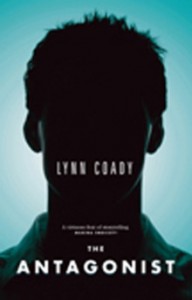 The jocks in my classes at university were always kind of fascinating. Mostly because one didn’t encounter them very often– I went to Uof T whose sports programs were notoriously poor-perfoming. But also because their academic skills always came as a kind of surprise, and because some of them were so big that they couldn’t fit into those chairs that had the desks attached, and had to sort of get wedged in, and I remember how completely uncomfortable these guys looked, how they rendered the world lilliputian, but somehow they were the freaks.
The jocks in my classes at university were always kind of fascinating. Mostly because one didn’t encounter them very often– I went to Uof T whose sports programs were notoriously poor-perfoming. But also because their academic skills always came as a kind of surprise, and because some of them were so big that they couldn’t fit into those chairs that had the desks attached, and had to sort of get wedged in, and I remember how completely uncomfortable these guys looked, how they rendered the world lilliputian, but somehow they were the freaks.
The jock, Rank, was only one of the many characters in Lynn Coady’s The Antagonist who I recognized so completely, who made me think, “I know these people.” Like Rank, I was also “born in a small town”, and so I recognized his father also, a guy called Gord who starts every sentence with, “That little fucker…” And the deadbeat, and his fat friend, and then the middle class versions of these guys who Rank encounters when he gets out of that small town and goes to university (and tries and fails to wedge himself into one of those impossible desks).
Or maybe what I mean is that Coady’s book had me realizing that I didn’t know any of these people at all, actually, and that my recognition of these type had no real connection with these characters’ inner workings, the circumstances of their lives. Coady has taken all kinds of familiar tropes here– foundling child grows up to be Paul Bunyan, to have the strength of Superman, local boy does bad and local boy does good, and local boy does everything he can to escape being created by a father who didn’t create him after all, or at least not biologically-speaking, and by the time Coady is through, these tropes are as unrecognizable as the types are, and here we’ve got a startlingly original novel with incredible depth and devourability.
Not that this is a novel without precedent. Coady’s last novel, 2006’s Mean Boy was a hilarious satire of university creative writing programs, and it had many of the same metafictional elements as The Antagonist (which is, in its own way, also a campus send-up). It even had an antecedent to protagonist/antagonist Rank, a big strapping drunk guy who’s prone to homicidal rages.
Rank is the whole story here, however, it’s his fingers at the keyboard tapping out a message to ghost from deep in his past. Or perhaps the ghost is himself, his younger self, who he’s just encountered in fictional form in a novel written by a former friend. A big strapping drunk guy who’s prone to homicidal rages, and Rank has recognized himself in his old friend’s story. Coady’s novel is Rank’s response to this recognition, a letter to the author to set the record straight.
Coady handles the structure (an email) so elegantly, with flourish (“Consider this the first chapter”), but eventually the structure fades away for the reader and the story runs the show. Rank (whose name is actually Gordon Rankin, Jr. He notes the moment of his uncomfortable awakening that he’s spent most of his life instructing people to call him “Stinky”) goes back to his childhood and adolescence to get to the root of his true story, the awkwardness of being a fifteen year old boy in a giant man’s body, and the expectations this body has foisted upon him. Which are mainly his father’s, that he’ll take care of any punks hanging around their family business, and with his outsized strength, this gets him into serious trouble.
Stories of a subsequent court case are woven around a later plot-line involving Rank and his friends at university (which he attends after achieving an unlikely hockey scholarship), and the inevitability of Rank once again conforming to type. The plot gestures toward this second story culminating in another act of violence, and there is also mystery surrounding what exactly happened to Rank’s mom, both of which make for compelling reading, even more-so because of the immediacy of Rank’s own voice, and the urgency of his message as he types the story home. He’s incredibly likable, but he’s terrifying, and there are these moments at which he undermines himself, and others where the story does it for him. He’s also a narcissist who can’t bear to look in the mirror, so convincingly embodying all of these contradictions, and the result is one of the most fascinating fictional creations I’ve encountered in a very long time.
And what’s even more fascinating, of course, is that he’s his own creation here, competing with someone else’s version of him, which opens up all kinds of questions about story and character, and the execution of both in real life. Embodying even more contradictions: Rank writes, “Even now, speaking to me from twenty years ago, you had me pegged./ Which makes no sense when I think about your book. How could it you could have me so nailed down and still get everything wrong?”
Lynn Coady has arrived with this amazing novel which combines its depth with broad appeal, and her trademark humour is also on display to balance out the story’s heaviness. She also manages to finally bring together the various plotlines in such a satisfying way, though this didn’t mean, of course, that I was any less devastated to have to stop reading because the story was over. (I was. I was. This is a novel that casts a spell.)
September 15, 2011
My Library Matters to Me
The good news is that I didn’t win the “My Library Matters to Me” essay contest, which means I won’t have to make (more) awkward conversation with Margaret Atwood. (Don’t get me wrong– I’m totally gutted. I really think my library matters to me more than it does to anyone. I can’t believe I didn’t win, and am going to demand a recount.) The even better news is that I can post my prize non-winning essay here as a blog post. Most of you have heard this old story before, but I think it becomes more and more true every time I tell it.
Back during my unsettled twenty-something days, my library card gave me roots in my neighbourhood, a sense of belonging. As a student and an avid reader, I made regular visits to my Spadina Road home branch to pick up stacks of books, though the branch itself I regarded primarily as a point for books transactions (ie. borrowing, returning, paying late fees in regards to).
When I had a baby, however, my perspective shifted. During those first few weeks of my daughter’s life when I wandered the neighbourhood shell-shocked, unhappy, under-slept and out of my mind, I’d go to the library for the sake of a destination. And perhaps the library staff saw the desperation in my eyes, because they reached out to me. I was always met with a smile, they would ask about my daughter, and tell me that she was adorable (never mind that at the time she most resembled a pickled amphibian).
One day the head librarian gave me a flyer for the library’s baby program. I was a bit dubious about how much I, a grown woman, would get out of a half hour of “songs, stories and tickling rhymes”, but it turned out to be a lot, because it was through the program that I began to learn how to be a mother. I learned how to engage with my daughter, how to play with her with stories and songs that delighted us both, and then my husband would come home from work and demand that I teach them to him so that he too could be part of the magic.
Life got better. I borrowed several books from the library that promised to teach me how to make my baby go to sleep, and none of them helped much, but more worthwhile were the baby development books, the lullaby CDs, the baby food cookbooks, and countless other books that had nothing to do with babies at all but were an indication that I had my life back.
All that was two years ago now, and we go to the library as often as ever. We’ve graduated from the baby program, and now attend the toddler program at the Lillian H. Smith branch, whose children’s collection is huge and always yields new treasures for our weekly haul.
So it’s about the books, of course, but it’s mostly about the people, because it’s rare that we go to the library and not encounter a familiar face. We’ve made some of our dearest friends through the children’s programming, there’s the staff we adore, and it’s such a natural spot to run into friends and other people in the area.
The library is truly the centre of our neighbourhood, and the reason why instead of being just another family in a big city, we feel like we’re a part of a community.
Now check out the pieces that won. Clearly, the TPL is beloved.
September 13, 2011
Books in Motion #9
The book is not dead, altered Ikea Billy bookcases notwithstanding. (Seriously! Seriously!) I know this because during these last few days, I’ve been riding subways like a person with places to go, and people to see. And what I’ve seen en-route are people reading– people riding science fiction, the Bible, Stig Larssen, Penelope Lively, The Sound and the Fury, Maeve Binchy, and some unidentifiable hardcover in the hands of a man who was also carrying a suitbag that was labelled “Ronald McDonald”. I’ve seen so many others too, but couldn’t be bothered to take note of all the titles, but the point is that the book still owns public transit, or at least during the hours I travel, which are hardly peak, but still.
Tonight on the ride home from Robert J. Wiersema’s event promoting his new book Walk Like a Man, I sat down beside a woman who was reading Dave Eggers’ What is the What? Another passenger approached her, wanting to know more about the book. “I’ve just started it,” she said. “It seems good though–” Which seemed like the perfect moment for me to add a bit of my own praise. “I loved it,” I said, and then explained that Eggers had written a fictionalized autobiography, which was a lot to explain actually as I was getting off at the next stop. But I was happy to share my opinions, being a a fairly broadly-read individual who thinks a lot about books. I assured the woman reading it that she’d enjoy it, and let them both know that the novel was well acclaimed.
And then I got off the subway and realized that neither of them knew that I was a fairly broadly-read individual who thinks a lot about books, the person accustomed to answering the bookish questions posed in my presence. To them I was just the crazy lady two seats over with an unkempt ponytail and too many shopping bags, and now I’m feeling a little embarrassed.
September 12, 2011
Mini Reviews: White Stone: The Alice Poems and The Wings of the Dove
 Last night at this time, I kept thinking to myself, “By tomorrow, I won’t be reading The Wings of the Dove anymore!” Partly because I’ve got so much going on at the moment that spending a week and a half reading a single book is kind of ridiculous (because it now means that I have five books to read by next Tuesday). And also because reading The Wings of the Dove is an all-consuming occupation that drives one cross-eyed if they work at it too long.
Last night at this time, I kept thinking to myself, “By tomorrow, I won’t be reading The Wings of the Dove anymore!” Partly because I’ve got so much going on at the moment that spending a week and a half reading a single book is kind of ridiculous (because it now means that I have five books to read by next Tuesday). And also because reading The Wings of the Dove is an all-consuming occupation that drives one cross-eyed if they work at it too long.
I really liked the book, though some bits I found so very tedious– Milly “I might be dying, but I’m probably not, and let’s live like I’m not, but yes, I’m probably dying. Don’t treat me any different for it, but let’s keep having this conversation” Theale in particular. I know she was magnificent, but I never really got it. I thought she was drippy. I thought everyone who worshipped her was a bit drippy vicariously. Everything going on around her, however, the Kate Croy/Merton Densher alliance against Aunt Maud (and also against themselves), and Kate’s background, and her bad father– I loved this. I loved Densher, with all those “And there you are”s, when it suddenly occurs to him that he’s never been in so many places at once. Kate’s point about the things people say about their enemies, but what really gets her is what people say about their friends. I’m fascinated by Kate’s coldness, and how James made her intentions and true nature so elusive. The story told me more about the story that wasn’t in the story than the story itself. But yes, it will be a sweet relief to next open a book and find it not written by Henry James, but rather, Lynn Coady….
Reading Henry James, however, this past week or so, I’ve found that poetry has been the perfect accompaniment. I read Stephanie  Bolster’s collection White Stone: The Alice Poems, and absolutely fell in love with it. It kept me up at night, because I couldn’t find a good place to stop reading and put it down. The poems are accessible, rich, full of story and history, and expand on myths that are familiar to so many. In these poems, The Poet imagines herself observing Charles Dodgson’s (Lewis Carroll’s) infatuation with the real Alice, Alice Liddell. She imagines herself present when Dodgson took his photos of the girl over many years, a stange enduring fly on the wall. And then Dodgson falls away, Bolster considers the actual history of Alice the woman, then she spirits the fictional Alice out into many additional incarnations (Alice with Persephone, Alice with Elvis, Alice with Christopher Robin). By the end of the book, as she had been with Lewis Carroll, Alice is a self-indulgent flight of fancy, but she’s wonderful, the book is so wonderful, and it’s no surprise that White Stone won the Governor General’s Award for Poetry back in 1998. Only realy question is why it’s taken me so long to discover it and read it. (But thanks to Nathalie Foy for finally taking care of this.)
Bolster’s collection White Stone: The Alice Poems, and absolutely fell in love with it. It kept me up at night, because I couldn’t find a good place to stop reading and put it down. The poems are accessible, rich, full of story and history, and expand on myths that are familiar to so many. In these poems, The Poet imagines herself observing Charles Dodgson’s (Lewis Carroll’s) infatuation with the real Alice, Alice Liddell. She imagines herself present when Dodgson took his photos of the girl over many years, a stange enduring fly on the wall. And then Dodgson falls away, Bolster considers the actual history of Alice the woman, then she spirits the fictional Alice out into many additional incarnations (Alice with Persephone, Alice with Elvis, Alice with Christopher Robin). By the end of the book, as she had been with Lewis Carroll, Alice is a self-indulgent flight of fancy, but she’s wonderful, the book is so wonderful, and it’s no surprise that White Stone won the Governor General’s Award for Poetry back in 1998. Only realy question is why it’s taken me so long to discover it and read it. (But thanks to Nathalie Foy for finally taking care of this.)





